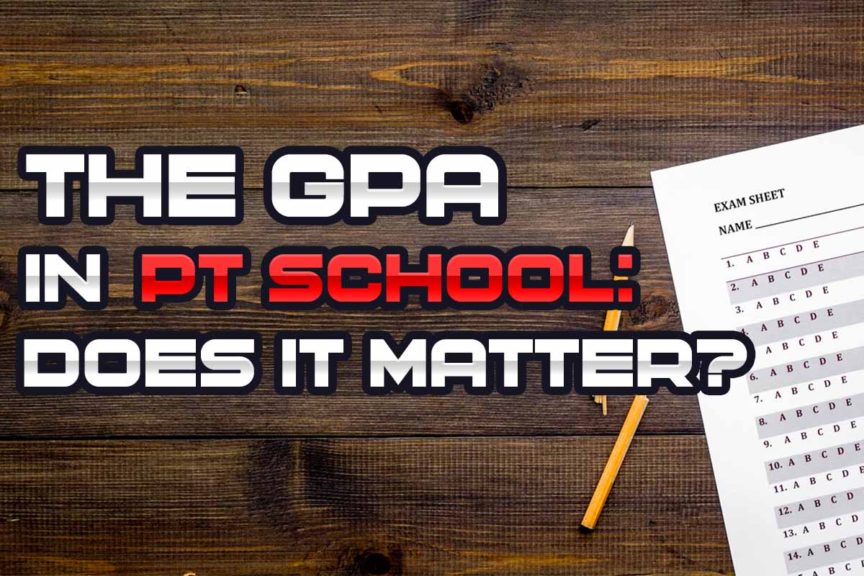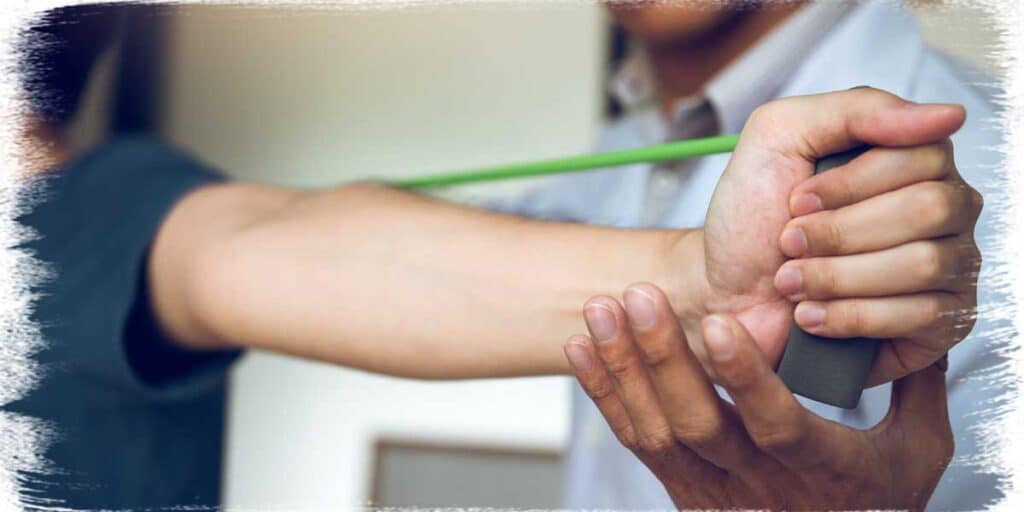Ahh, the good ol’ grade point average. You likely already know that students need one that’s relatively high to get into PT school, but does keeping a super-high GPA matter once you’re actually in your physical therapy program? Is it a true determiner of how proficient you’ll be as a clinician after that? Well, kind of…but also not really.
There are a ton of other more important factors to focus on besides GPA while in your program, and being aware of this will not only help you enjoy your time in the program to a much greater extent, but it will also likely better prepare you for clinical life after you graduate.
GPA within physical therapy school needs to stay above the minimum requirement, but aside from that, it doesn’t matter nearly as much as other factors such as your overall commitment to work hard for your own personal benefit and future patients. GPA is hardly everything in PT school.
Now, there’s A LOT to unpack with this general statement, and being aware of the various components that are better predictors of academic and clinical success will provide you with some serious secret sauce in terms of getting the most out of your academic pursuits.
So, if you want to know all the details, you gotta keep on reading!
ARTICLE OVERVIEW (QUICK LINKS)
Click/tap on any of the following headlines to instantly jump to that section of the article!
Don’t chase perfectionism; chase the big picture
What the GPA actually represents in PT school
True predictors of your overall success
This is not a license to get complacent in school
Final thoughts
Here’s the quick takeaway of this article: Using grades and GPA to solely predict your future clinical success and overall competency as a professional is equivalent to predicting a patient’s prognosis for an overall healthy and high-quality life based on whether they get the weekly recommendation of vegetables within their diet — sure, it’s an indicator, but when looked at purely in isolation, it doesn’t tell you (or guarantee) much at all. There’s SO much more that needs to be examined.
Don’t chase perfectionism; chase the big picture
If you’re someone who struggles with perfectionism or perhaps feels an intense amount of self-imposed pressure for getting a 4.0 GPA while in your PT program, I’d highly encourage you to shift your mindset. I’m not saying that it’s an outright mistake or that you’re a terrible person for striving for one. Still, you need to always keep the big picture in mind, especially if you feel you’re under some form of unpleasant pressure when it comes to attaining this mark of “perfection”.
Remember this: If you’re only working hard because you want a 4.0, you’re running the wrong race or climbing the wrong mountain.
Related article: How to Succeed in PT School (Don’t Make These Mistakes)
The big picture as a PT student
Chasing a 4.0 simply because you seek academic perfection misses the entire point of what you’re doing as a student. What you’re doing as a student — and ultimately a future physical therapist — is developing a skillset based around critical thinking, social and emotional intelligence and clinical competence. All of these essential factors extend FAR beyond what a grade point average can objectively measure.
“Challenge yourself to think bigger than just the next couple of academic years. How can you work hard while in school in ways that will specifically set you up for greater clinical success once you graduate?”
– Strength Resurgence
Yes, grades can be an indicator of the extent to which you’re beginning to understand and master some of the essential clinical content that will be expected of you, but that’s only one small slice of the relatively large “exemplary student physical therapist” pie.
Having perfect grades in PT school without having underlying critical thinking skills or social and emotional intelligence is like having a formulated multivitamin that you take every day even though you have no access to food each day. It’s an egregious oversight to think that grades are purely the solution when you can’t prop up your knowledge on structures that allow you to act on them effectively.
Related article: How to Do Well in PT School: Five Principles PT Students MUST Follow
The big picture as a physical therapist
Newsflash: Your patients won’t care about your GPA when you were in school; they will care if you can help them or not while treating them with dignity and respect. They will be in pain or be facing physical limitations, often with fear or concern. Your GPA isn’t going to be what comforts them, nor will it be what builds trust with them or shows them that you’re competent and understand what they’re up against. Sorry, but it just won’t.
Look beyond school. Grades stop after school, and no one will care what they were. Working hard only for grades is essentially picking the wrong destination to head towards in your clinical journey. Yes, the grades should serve as a waypoint along that journey, but they are not the destination. They are trail markers that help you know whether you’re staying on the correct path or starting to veer off course. But they don’t provide much information beyond that.
Challenge yourself to think bigger than just the next couple of academic years. How can you work hard while in school in ways that will specifically set you up for greater clinical success once you graduate? This will look different for each individual, but adopting a mindset that will help you continually look at the big picture rather than perfectionism will ensure greater clinical success (and likely, satisfaction) than a 4.0 GPA ever could.
What the GPA actually represents in PT school
I’m not saying that the GPA is an entirely useless metric, nor that it should therefore be abandoned. What I am saying, instead, is that it is not this all-knowing, be-all-end-all metric for which a student should base their overall proficiency and potential for success.
Think of the PT curricula as a journey, with graduation being the endpoint of that particular journey. In that case, your grades (and thus GPA) are nothing more than waypoints or guideposts to let you know whether you’re on the path to successfully navigate (and complete) your program. They are reference points, indicators that show where you need to tighten up and where you’re doing just fine on the route to completion.
What they’re not is a complete picture of who you are as a passionate student and a future clinician. There is more in you than is reflected by your GPA in school, and you must remember this whether you’re cruising along with a 4.0 or barely meeting the minimum requirement to stay in your program.
The quick takeaway here: GPA can be a distraction and a false sense of security. It’s a general guidepost, but nothing more than that.
Grades and grade point average are merely a subset of school, which is a subset of clinical practice, which is a subset of life. Life is the big picture here, not merely the three years you spend in your PT program.
Related article: How to Prepare for PT School: Five Smart Steps to Take
True predictors of your overall success
Grades and overall clinical competence aren’t necessarily related. And you can be really let down in the real world when it comes to starting up a clinical career despite graduating with a 4.0 GPA; a 4.0 doesn’t mean that you’re going to be an exceptional physical therapist, trust me.
What you would be wise to consider is WHY you’re working as hard as you are. My belief is that if you’re working hard because you want to better serve and treat your future patients, then you will find infinitely more value, meaning, and greater fulfillment than if working hard strictly for a 4.0 GPA.
You can be academically gifted but have zero ability to effectively convey and relate that knowledge to patients in the clinic; you can memorize pages of specific information yet lack the competence to develop trust in your patients and make them feel like they are being heard and understood.
The physical therapy profession is filled with many academically gifted students who don’t develop successful clinical caseloads or careers. Conversely, it’s also filled with many average professionals from a grade point perspective in school, but after that, crush it with clinical excellence and successful careers.
A better predictor of your overall success (in school and outside of it) than your GPA are the reasons why you’re choosing to find significance and meaning in learning the academic material.
Are you learning it simply for the grades, or are you learning it because you believe you’re called to be the best student-version and clinical-version of yourself possible? Are you more interested in grades or in helping others with clinical reasoning and expertise that you’ve worked hard to acquire as a means for providing them with better care?
Now, if you graduate with a 4.0 or a very high GPA, I want you to celebrate that and in no way want to downplay your hard work. Instead, I just want you to know that it’s not a guarantee that it will make your career smooth sailing right from the start. Indeed, it will help, which is handy, but it’s not everything.
True predictors of who you will be as a future physical therapist and how successful you will be are more likely to be found in the meaning that you see with your hard work and studies in your program. In other words, if you can find more meaning in the process than in the outcome, and if you can learn to find the significance in giving your best efforts with learning the material, you’ll likely become a physical therapist who leaves a legacy when all is said and done.
This is not a license to get complacent in school
Now, let’s be perfectly clear that none of this means that you get to be complacent with your grades and overall work ethic. Any wise and passionate student physical therapist will recognize the need to push themselves to their fullest academic extent possible.
But why would you work hard while in school if grades aren’t the most authentic way to demarcate yourself from others? Why strive with your best academic efforts in school? Why not put in just enough effort to stay above the minimum and just casually float on by?
As mentioned above, it’s because those who find significance and meaning in the process they go through or journey they’re on (rather than solely the end result or destination) tend to experience much more personal growth and satisfaction with their pursuits, dreams and goals.
If I were you, I’d still strive hard to get the highest grades you can, but not because it guarantees any sort of clinical success or recognition down the road, but rather since it instills within you a mentality that prepares you for the riggers of life itself. You are still keeping your “eyes on the prize,” but it just so happens that you have your eyes set on a more profound and meaningful prize: more significant personal and professional growth.
For me, my mindset was never fixated on “I need to work hard for a 4.0” but rather “I need to work hard because that’s simply what I’m called to do, both in my academic life and in all other aspects of my life as well.“
More concisely quoted: “If I do the things that are easy, life will be hard, but if I do the things that are hard, life will be easy.”
We are all motivated by — and want — different things in school and in life. My goal isn’t to tell you what to be driven by, but rather to suggest why you need to be motivated along with why it’s more important to fall in love with the process (studying, learning, applying, etc.) than the end result (a silly GPA).
Related article: Is Physical Therapy School Hard? What PT Students MUST Know
Final thoughts
GPA doesn’t matter as much as the reason why you’re working hard. And your identity certainly isn’t found in a grade point average. Where you choose to place and find your identity is up to you. Still, I would certainly contend that it’s located more towards the reasons why you choose to work hard in the classroom, in the clinic, the community and with life in general.

Hi! I’m Jim Wittstrom, PT, DPT, CSCS, Pn1.
I am a physical therapist who is passionate about all things pertaining to strength & conditioning, human movement, injury prevention and rehabilitation. I created StrengthResurgence.com in order to help others become stronger and healthier. I also love helping aspiring students and therapists fulfill their dreams of becoming successful in school and within their clinical PT practice. Thanks for checking out my site!





